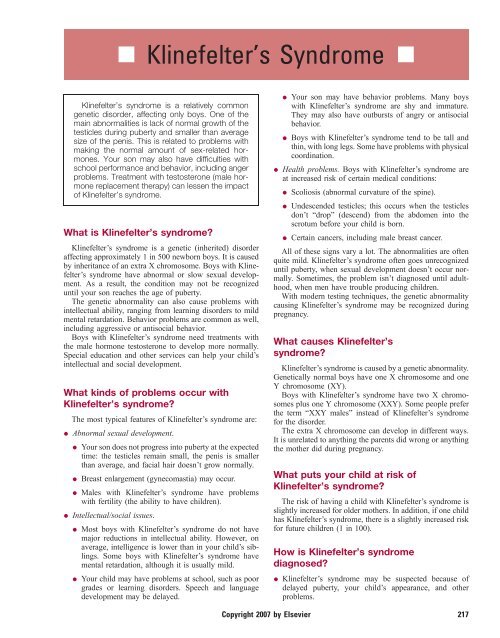Klinefelter's Syndrome - The Therapy Center
Klinefelter's Syndrome - The Therapy Center
Klinefelter's Syndrome - The Therapy Center
Create successful ePaper yourself
Turn your PDF publications into a flip-book with our unique Google optimized e-Paper software.
n Klinefelter’s <strong>Syndrome</strong> n<br />
Klinefelter’s syndrome is a relatively common<br />
genetic disorder, affecting only boys. One of the<br />
main abnormalities is lack of normal growth of the<br />
testicles during puberty and smaller than average<br />
size of the penis. This is related to problems with<br />
making the normal amount of sex-related hormones.<br />
Your son may also have difficulties with<br />
school performance and behavior, including anger<br />
problems. Treatment with testosterone (male hormone<br />
replacement therapy) can lessen the impact<br />
of Klinefelter’s syndrome.<br />
What is Klinefelter’s syndrome?<br />
Klinefelter’s syndrome is a genetic (inherited) disorder<br />
affecting approximately 1 in 500 newborn boys. It is caused<br />
by inheritance of an extra X chromosome. Boys with Klinefelter’s<br />
syndrome have abnormal or slow sexual development.<br />
As a result, the condition may not be recognized<br />
until your son reaches the age of puberty.<br />
<strong>The</strong> genetic abnormality can also cause problems with<br />
intellectual ability, ranging from learning disorders to mild<br />
mental retardation. Behavior problems are common as well,<br />
including aggressive or antisocial behavior.<br />
Boys with Klinefelter’s syndrome need treatments with<br />
the male hormone testosterone to develop more normally.<br />
Special education and other services can help your child’s<br />
intellectual and social development.<br />
What kinds of problems occur with<br />
Klinefelter’s syndrome?<br />
<strong>The</strong> most typical features of Klinefelter’s syndrome are:<br />
Abnormal sexual development.<br />
Your son does not progress into puberty at the expected<br />
time: the testicles remain small, the penis is smaller<br />
than average, and facial hair doesn’t grow normally.<br />
Breast enlargement (gynecomastia) may occur.<br />
Males with Klinefelter’s syndrome have problems<br />
with fertility (the ability to have children).<br />
Intellectual/social issues.<br />
Most boys with Klinefelter’s syndrome do not have<br />
major reductions in intellectual ability. However, on<br />
average, intelligence is lower than in your child’s siblings.<br />
Some boys with Klinefelter’s syndrome have<br />
mental retardation, although it is usually mild.<br />
Your child may have problems at school, such as poor<br />
grades or learning disorders. Speech and language<br />
development may be delayed.<br />
Your son may have behavior problems. Many boys<br />
with Klinefelter’s syndrome are shy and immature.<br />
<strong>The</strong>y may also have outbursts of angry or antisocial<br />
behavior.<br />
Boys with Klinefelter’s syndrome tend to be tall and<br />
thin, with long legs. Some have problems with physical<br />
coordination.<br />
Health problems. Boys with Klinefelter’s syndrome are<br />
at increased risk of certain medical conditions:<br />
Scoliosis (abnormal curvature of the spine).<br />
Undescended testicles; this occurs when the testicles<br />
don’t “drop” (descend) from the abdomen into the<br />
scrotum before your child is born.<br />
Certain cancers, including male breast cancer.<br />
All of these signs vary a lot. <strong>The</strong> abnormalities are often<br />
quite mild. Klinefelter’s syndrome often goes unrecognized<br />
until puberty, when sexual development doesn’t occur normally.<br />
Sometimes, the problem isn’t diagnosed until adulthood,<br />
when men have trouble producing children.<br />
With modern testing techniques, the genetic abnormality<br />
causing Klinefelter’s syndrome may be recognized during<br />
pregnancy.<br />
What causes Klinefelter’s<br />
syndrome?<br />
Klinefelter’s syndrome is caused by a genetic abnormality.<br />
Genetically normal boys have one X chromosome and one<br />
Y chromosome (XY).<br />
Boys with Klinefelter’s syndrome have two X chromosomes<br />
plus one Y chromosome (XXY). Some people prefer<br />
the term “XXY males” instead of Klinefelter’s syndrome<br />
for the disorder.<br />
<strong>The</strong> extra X chromosome can develop in different ways.<br />
It is unrelated to anything the parents did wrong or anything<br />
the mother did during pregnancy.<br />
What puts your child at risk of<br />
Klinefelter’s syndrome?<br />
<strong>The</strong> risk of having a child with Klinefelter’s syndrome is<br />
slightly increased for older mothers. In addition, if one child<br />
has Klinefelter’s syndrome, there is a slightly increased risk<br />
for future children (1 in 100).<br />
How is Klinefelter’s syndrome<br />
diagnosed?<br />
Klinefelter’s syndrome may be suspected because of<br />
delayed puberty, your child’s appearance, and other<br />
problems.<br />
Copyright 2007 by Elsevier 217
218 n Klinefelter’s <strong>Syndrome</strong><br />
Genetic testing is needed to confirm the gene abnormality<br />
causing Klinefelter’s syndrome. Although the XXY pattern<br />
is most common, other variants can occur. We will<br />
likely recommend a visit to a medical geneticist, a doctor<br />
specializing in genetic diseases, who can provide more<br />
complete information.<br />
How is Klinefelter’s syndrome<br />
managed?<br />
Several types of treatment are helpful for boys with<br />
Klinefelter’s syndrome:<br />
Testosterone replacement. Regular treatments with the<br />
male hormone testosterone can help to normalize your<br />
son’s sexual and physical development. A doctor specializing<br />
in hormone problems (endocrinologist) can manage<br />
this part of your child’s treatment.<br />
Treatment for enlarged breasts. Enlarged breasts (gynecomastia)<br />
can be a problem in boys with Klinefelter’s syndrome.<br />
<strong>The</strong> problem may improve over time, and the<br />
endocrinologist can recommend treatment, if needed.<br />
Help with school and behavior problems. Your son may<br />
need extra help in school, particularly with speech/language.<br />
Special education services are available in every<br />
state. You are entitled to expert evaluation of your child.<br />
Based on the results, an Individualized Education Program<br />
(IEP) can be developed to meet your child’s educational<br />
needs.<br />
Infertility treatment. For some men with Klinefelter’s syndrome,<br />
special infertility treatments may make it possible<br />
to have children.<br />
When should I call your office?<br />
Learning that your child has a genetic disorder is a difficult<br />
situation for any parent. Call our office if you have any<br />
questions about this disorder, especially how to access the<br />
expert medical care and other services your son needs.<br />
Where can I get more information?<br />
Information on resources and support for families affected<br />
by Klinefelter’s syndrome/XXY conditions is available<br />
from Klinefelter <strong>Syndrome</strong> & Associates on the Internet<br />
at www.genetic.org/ks, or call 1-888-XXY-WHAT (1-888-<br />
999-9428).<br />
Copyright 2007 by Elsevier

















